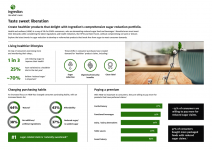EU recognises erythritol as zero calorie sweetener
Erythritol, a bulk sweetener polyol that occurs at low levels in some fruits and fermented foods, contains a variety of benefits, including low-calorie content, low GI index and a low laxative effect.
"We have high hopes for [Cargill's branded erythritol] Zerose," said Henry Hussell, head of marketing at Cargill Sweetness.
Hussell explained to FoodNavigator.com that manufacturers can significantly cut the calorie value in a formulation, lifting products into the realm of reduced calorie, or low-calorie status.
Against the backdrop of soaring obesity and diabetic statistics, consumer and political pressure is driving manufacturers to slice calories from their food formulations. This need now resonates in the halls of ingredients' firms, in turn driving new solutions to market.
Cargill's erythritol sweetener, produced through the fermentation of glucose or sugar, hit the US market in 1997. In Europe, erythritol achieved novel foods approval in 2006 and the subsequent directive required that all member states recognise it as a permitted ingredient within 18 months.
Until now, the energy conversion value of zerose erythritol within the EU was the same as all other polyols, 2.4 kCal/g. But Commission directive 2008/100/EC - posted in Europe's official journal on 28 October – now changes this, establishing that the energy conversion value of erythritol is zero calories.
"An opinion from the European Food Safety Authority in 2003 echoed the low-calorie status of erythritol," said Hussell. Since this time, the agribusiness behemoth has been awaiting official recognition for the low-calorie level from the Commission.
Member states have one year to absorb the new rule into national legislation.
And with the status comes fresh new opportunities. "There is lots of potential for this ingredient, and we anticipate that the official recognition from Europe regarding its low-calorie status will speed up new product launches," continued Hussell.
In terms of sector, Cargill anticipates particular appeal from the dairy and confectionery areas. The luxury axis still dominates chocolate confectionery, with low-calorie and health-positioned products very much at a grass roots level. But Hussell suggested that confectioners, by using erythritol in their premium products, can bring an added-bonus, an extra level of gain, to the final product that is, at once luxury, and low-calorie.
At this week's HiE in Paris, Cargill will showcase a number of prototype applications using Zerose in dairy and confectionery recipes. "For a yoghurt showcased at the HiE, 6.5 per cent of the product is zerose, which has achieved a good level of calorie reduction," said Hussell.
Speaking with FoodNavigator.com in May this year, Hussell recognised that erythritol "is not an easy ingredient to use", since it is not simply a question of replacing sugar, as it is with maltitol, for instance.
While maltitol may be more adaptable, it has less advantages than erythritol, such as the taste properties and the zero calorie level.
The key, Hussell said, is combining it will another sweetener ingredient, but in a way so as not to negate the 30 per cent calorie reduction that erythritol affords.
"We have also found that in terms of taste masking, Zerose works well with intensive sweeteners to 'round' them off, allowing for a more pleasant taste profile," he said this morning.
And as the consumer palate evolves away from strong sweet tasting profiles, Cargill claims Zerose, with a sweetness profile 60 per cent of sugar, can also help formulators achieve a product that tastes "less sweet."
On the subject of price, Henry Hussell commented: "It is more expensive than sugar and is not the sort of product to go into mainstream, high volume products."
Erythritol is also manufactured in Europe by Jungbunzlauer.

















